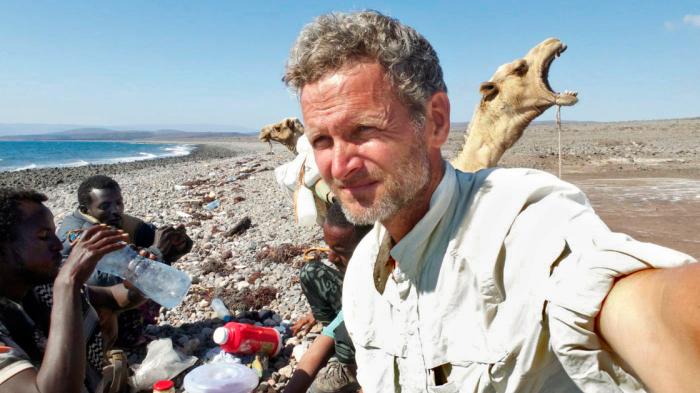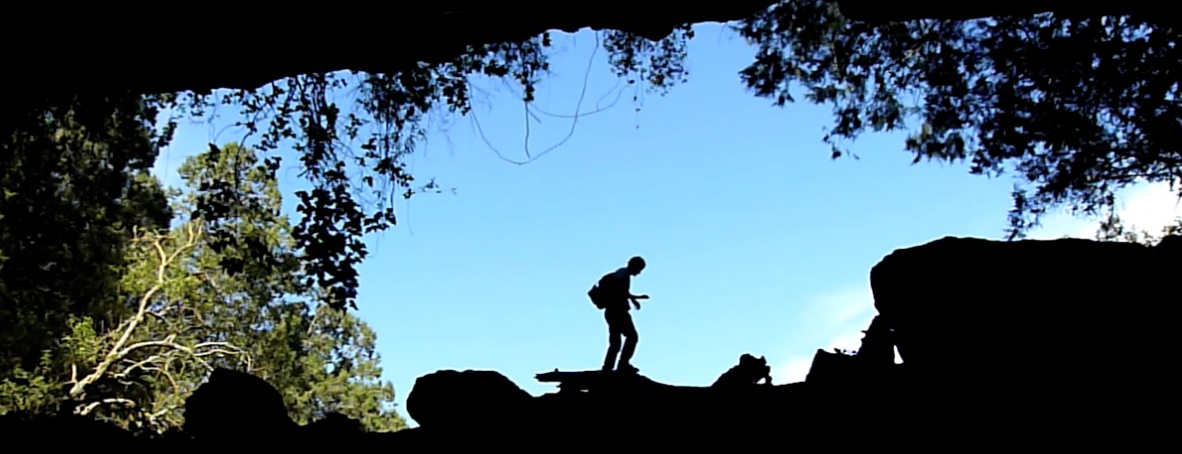
Pulitzer Center grantee and National Geographic fellow Paul Salopek, on his slow-journalism walk around the world, speaks with NPR's Brooke Gladstone for On the Media . See the transcript of the full interview below.
BROOKE GLADSTONE: That's one way to bring untold stories to a wider world. Here's another. For more than two decades, two-time Pulitzer Prize winning journalist Paul Salopek has reported all over the world, but never like he is right now. Since January, Salopek has been on what he calls the "Out of Eden Walk," retracing the path of our human ancestors across the globe. His 21,000 mile trek, which began in East Africa's Great Rift Valley, will end seven years from now in Tierra del Fuego, the southernmost tip of South America. Here he is on a boat, which he calls an anti-ark, a floating barnyard delivering thousands of sheep from Djibouti to Jiddah for slaughter. He smells the ammonia reek of the pens, hears the thrum of the diesel and catches the song of canaries.
[CANARY SOUNDS]
"It was the morose engineer," wrote Salopek. "He sits at his post at night, playing songbird recordings over and over on his computer. He says it reminds him of a better world." We have Salopek on the phone from Saudi Arabia. Paul, are you doing this mostly by foot?
PAUL SALOPEK: If this all works out, about 90 percent of it will be on foot. But because I'm retracing the path of ancient migrations, our ancestors somehow got across the Red Sea, so I did likewise on a, on a camel boat.
BROOKE GLADSTONE: You're reporting in a number of ways, tweeting, dispatching, videos. You have a process, right?
PAUL SALOPEK: Yeah, what we're doing is two levels, actually. One is reporting a little bit like I did as a conventional foreign correspondent, where as I stumble across stories en-route, I report those whether it's in a village or in a city or out in the desert somewhere. But there's a more methodical template, as well, and that is every 100 miles I stop and take what I'm calling a narrative milestone or a core sample, if you will, where I'm recording, using multimedia, what the surface of the earth looks and sounds like at that particular geo-coded spot. And I'll be doing it for 21,000 miles across the world.
BROOKE GLADSTONE: Can you give us a taste of that?
PAUL SALOPEK: Yeah. I was walking with camels through the Rift Valley of Ethiopia, and one of these milestones happened to occur next to a highway. So, ironically, you have imagery of Afar nomads, some of whom are carrying daggers, with camels in the background, and the sound turns out to be a steady stream of trucks, a kind of stream of the Africa scene in the modern human-made world providing ambient sound, the throb of tires on asphalt.
BROOKE GLADSTONE: And what's it supposed to add up to?
PAUL SALOPEK: It'll be a record, like beads along a string, of what the world looks like along the path of our ancestors from Africa through Asia, all the way down into the tip of South America, the oldest stories we tell ourselves, going back in most cultures, are journey stories, the quest stories. And as a foreign correspondent, I was doing this but in a pointillist fashion. I'd do a dab of a story here, get on a plane and, and do another dab over here. And what I finally was able to concoct with this idea was a single linear narrative that connects all the stories that I've written in the past, and stories that I can't even imagine in the future, into a single journey story. And by slowing down, the idea is to be able to immerse myself in the headlines in a way that a conventional foreign correspondent often can't.
BROOKE GLADSTONE: How have you immersed yourself into the story?
PAUL SALOPEK: I'll just give you an example. I walked up to the Rift Valley of Africa that is a, a combat zone. It's a scene of a resource war between two ethnic pastoral groups, the Afar and the Issa. I noticed as we were walking, Brooke, across this, to my eye, featureless landscape, salt flats stretching as far as the eye could see, my Afar friends who were walking with me were doing S curves, stretching over miles. And I would ask them, I'd say, "Why are we doing this? I've got a GPS, we can go straight to well X or oasis Y." And they looked at me as if I was stupid, because what they were walking along were invisible boundaries of conflict that only they and their enemies could see. And that gave me an appreciation about invisible borders that conventional reporters don't see.
BROOKE GLADSTONE: That's remarkable. Do you feel, at any point, that you may get involved in a story?
PAUL SALOPEK: I feel like I've managed to function best in a storyteller's mode. You know, you are kind of like a blank slate when you're a walker coming into a village or a town. It's remarkable. People spill their stories to you because they can't really share it with neighbors. They see you as a neutral party, they see you as somebody who's safe. When people moved way back and told stories the way I am now, kind of ambulatory storytelling, whether it was Greek bards or West African griots, they had a special status, the way traders did, where you sort of left them alone. You didn't bother them because they were bringing a commodity to you. And I'm hoping to tap into that tradition. So if I start becoming a participant in the story, then I might lose part of the story.
BROOKE GLADSTONE: What part of the upcoming trip scares you the most?
PAUL SALOPEK: I would have to break it down. I think there's a physical plane. There are landscapes that are bloody hard to move through, even in a mechanized fashion, much less on foot. Think about Siberia. That is probably going to be the most physically demanding part. The other thing that's kind of counterintuitive is that people have made comments to me as I've walked out of the Horn of Africa, which is this parched – very economically deprived part of the world, saying, "Boy, Paul, you're walking through probably the hardest part at the beginning. And I'm having to correct them because, actually, it's very congenial to walk through economically deprived parts of the world because people still walk. So it's actually easier to find walking companions.
BROOKE GLADSTONE: Mm.
PAUL SALOPEK: It's easier to find walking trails across a landscape that's shaped by the human foot.
BROOKE GLADSTONE: You talked at the beginning of the interview about how we've always loved quest stories. But what's the quest? What's the grail at the end of all of this?
PAUL SALOPEK: Well, there's a grail for me and hopefully a grail for my readers. For me, very selfishly, I want to improve as a writer. I want to see what slowing down and partaking richly of a story does to my storytelling. And on the part of my readers, my hope is to slow them down, as well, highlight the joys of attentiveness, highlight the joys of sticking with narratives that might be longer than they're used to, that might have a narrative thread that goes not for 24 hours but for weeks and even years.
BROOKE GLADSTONE: You're not proposing this as a form to replace conventional foreign reporting, right?
PAUL SALOPEK: You know, I've been asked by colleagues, saying, "Paul, it's a wonderful idea, it's a wonderful concept, but are you dismissing the need for a TV crew to go rush to a terrorism attack?" And of course not, of course not. I'm not being polemical about this. This, again, is a laboratory for me. But what I am saying is that had we slowed down a bit, increased our attention span a bit with critical stories from the 1980s and 1990s, had we "walked," as it were, in quotes, through the refugee camps on the Afghanistan-Pakistan border, we may not have had as many crises to report in the early 2000s. I think the, the reactive drive by nature of modern journalism is self-defeating because it provides less and less analysis, and we take our eyes off stories that fester and then become a self-perpetuating cycle of crisis reporting.
BROOKE GLADSTONE: Paul, thank you very much.
[MUSIC UP AND UNDER]
PAUL SALOPEK: You're welcome.
BROOKE GLADSTONE: We caught up with Paul Salopek who's on a seven-year foreign reporting trip, retracing the path of our human ancestors out of Africa, sponsored by National Geographic and the Knight Foundation. Just Google "Out of Eden Walk" to follow along.



